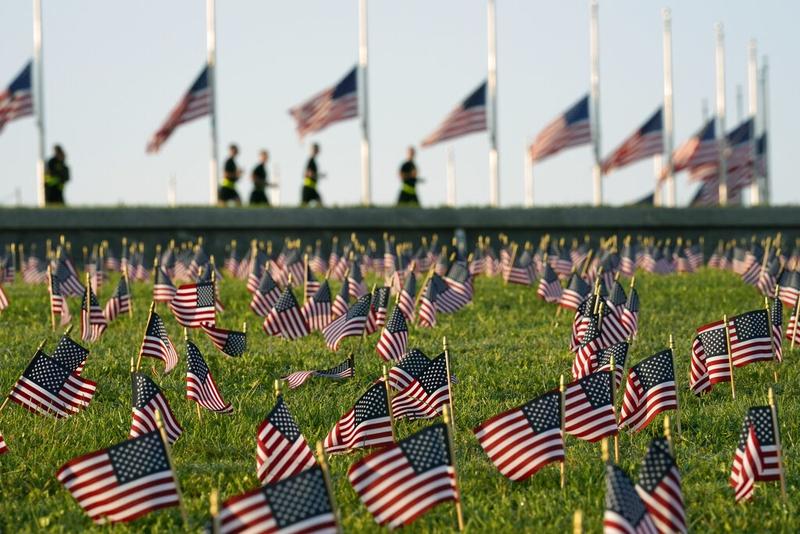 Activists from the COVID Memorial Project mark the deaths of 200,000 lives lost in the US to COVID-19 after placing thousands of small American flags on the grounds of the National Mall in Washington, Sept 22, 2020. (J. SCOTT APPLEWHITE / AP)
Activists from the COVID Memorial Project mark the deaths of 200,000 lives lost in the US to COVID-19 after placing thousands of small American flags on the grounds of the National Mall in Washington, Sept 22, 2020. (J. SCOTT APPLEWHITE / AP)
The United States on Tuesday logged more than 200,000 deaths from the coronavirus, as experts warned of further increases in infections and mortality as cooler fall weather moves people indoors.
The US, long the country worst hit by the virus, accounts for one-fifth of the global casualties from the pandemic. More than 6.85 million infected with the virus, according to data compiled by Johns Hopkins University, which registered a global death toll of 965,575.
That means the US toll has doubled in four months-in late May the country reported 100,000 deaths from the disease.
In its update to global COVID-19 mortality projections last week, the University of Washington's Institute for Health Metrics and Evaluation predicted that cumulative deaths by Jan 1 would hit 378,320
"These are not numbers; these are human beings. These are friends and family," Ali H. Mokdad, chief strategy officer of the Population Health Initiative at the University of Washington, or UW, told China Daily.
"I'm concerned that we're coming into fall and winter where we'll have more infection and we'll have much more mortality, unfortunately," he said in a video interview.
ALSO READ: US surpasses grim milestone of 200,000 COVID-19 deaths
On Monday, the US Centers for Disease Control and Prevention, or CDC, withdrew guidance that had said airborne transmission was thought to be the main way the coronavirus spreads. It said the draft recommendation was "posted in error" on Friday.
Commenting on the sudden reversal, Mokdad said it was confusing and that people may lose trust if the messaging is not consistent and changes are made without explanations.
"Potentially (there will be) another 200,000 deaths between now and January, (so) we have to be very careful, since we are moving indoors, because cold weather is coming," he said. "It's better to make sure that we are on the conservative side with our recommendations in that regard."
In its update to global COVID-19 mortality projections last week, UW's Institute for Health Metrics and Evaluation predicted that cumulative deaths by Jan 1 would hit 378,320.
The institute cited "steeper than expected declines" in several states as the factors for lowering an estimate of 415,000 deaths by year's end that it had predicted on Sept 10. But it cautioned deaths could surge to more than 3,000 per day by the end of December.
READ MORE: Fauci disagrees with Trump on virus, cites disturbing statistics
Gradual understanding
"So far we have been underestimating by a little bit the mortality for several reasons. We assumed that when a state reaches eight deaths per day per million, they will go to a lockdown," Mokdad said. "Unfortunately, we underestimate because we assume that states will do something, and states sometimes don't do (that)."
The institute said increasing mask use to 95 percent could save nearly 115,000 lives, reducing the expected number of deaths by 62.7 percent.
Mokdad, a UW professor of health metrics, said that in the US, every state decided to do something different. "CDC China had a very consistent message and told people exactly what they need to do. Sometimes when people didn't wear a mask, there was enforcement," he said. "We know in the United States when you recommend something and you don't enforce it, sometimes it doesn't work."
He said that the US could have done better by locking down earlier and "making sure we stay locked down until we control the virus".
US President Donald Trump, who admitted to a journalist that he had played down the risk of the virus early on because he did not want to "create a panic", continued to talk of a light at the end of the tunnel.
READ MORE: Trump admits downplaying danger of virus
Charles Silver, a law professor at the University of Texas at Austin, and David A. Hyman, a law professor at Georgetown, said the pandemic was the third great crisis of the 21st century and it has already inflicted a greater toll in lives lost and economic hardship than the Sept 11 terror attacks and the 2008 financial collapse combined.
"The federal government was not ready for COVID-19, even though it has dealt with epidemics and pandemics for more than a century," they said in a report titled COVID-19: A Case Study of Government Failure.


